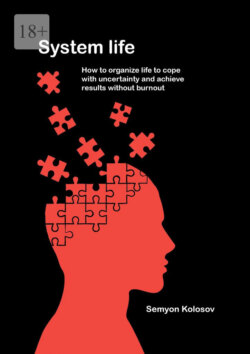Читать книгу System life. How to organize life to cope with uncertainty and achieve results without burnout - Семён Колосов - Страница 18
Chapter 2. Planning
There are no guarantees
ОглавлениеBefore planning, you need to take vitamins for thinking in the form of the text below. So that the update of the growth mindset accelerates and gets deep into your mind. Reading about the VUCA world, we seem to understand that there is uncertainty, and this is the norm, but we do not consciously accept it. Because certainty is a drug for our brain, and it’s not easy to do without it. We want to be sure that our company will not be closed during the pandemic, the working meeting will go well, the bank will not go bankrupt, the developer will not disappear, there will be a guarantee of work, we will have enough money to survive the crisis and so on and so forth. We want everything to be clear, stable, predictable. We want to organize everything, get guarantees, insure ourselves, avoid difficulties. We cannot stand uncertainty, and we begin to break down when it is unclear what will happen next. So strong that it is impossible to tolerate it, and we start having anxiety. Research has proven that we tolerate pain more easily than uncertainty, because pain is understandable to us. For example, the uncertainty that everything is going well at work has a worse effect on health than dismissal. No one is to blame for this. This is how our brain works. Look at the SCARF social behavior model (Status, Certainty, Autonomy, Relatedness, Fairness), which was developed by David Rock. It explains the five main goals that our brain perceives as critically important:
1. Status – a sense of respect caused by a position in the hierarchy;
2. Certainty – the ability to predict the consequences;
3. Autonomy – a sense of control over what is happening;
4. Relatedness – a sense of security next to others;
5. Fairness – the perception of a fair exchange.
Everything is quite logical. With the help of these goals, our brain fulfills the well-known instinct of self-preservation. From the second point it is clear that the brain wants confidence, and considers all the unknown stuff to be dangerous. It must know what any action will lead to, and will do everything to avoid uncertainty. But there is no certainty! If it were, we could say with 100% certainty that the ruble would not devalue, there would be no self-isolation, a war would not start, a meteorite would not fall to the Earth, etc. We try to make predictions, but there is no certainty anymore. If there had been, then 10 years ago you could have said: «I want to be the manager of a virtual influencer on a social network,» but no one could have imagined that such a thing could be. And no amount of forecasting would help to predict it. No matter how much we strive for certainty, we will never be able to get it. The brain wants what it doesn’t have. Yep, what a paradox. Think for yourself, there is no certainty in anything. Anything can happen, anytime. This has not been news for a long time. Nassim Taleb wrote everything in his books a long time ago. But the task of learning to accept uncertainty is still very relevant.
